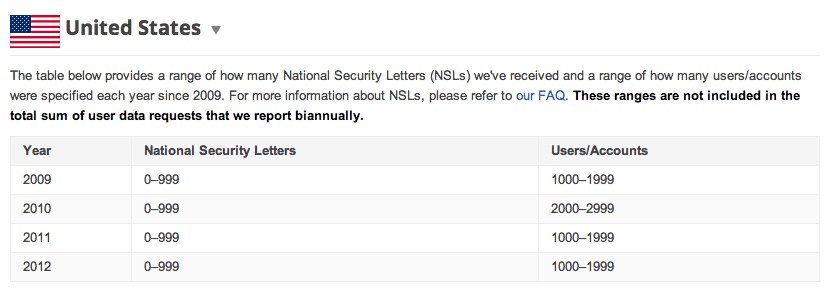National Security Letters Target Thousands of Google Accounts
Given the fact that the FBI's National Security Letters come accompanied by gag orders making it illegal to reveal to anybody that you are the very special recipient of an order to release information to the feds, it's a happy wonder that Google is providing even a glimpse into the company's experience with the things. According to a transparency report released yesterday, (most of) the world's favorite search engine has received fewer than a thousand such letters per year from 2009 through 2012, with between 1,000 and 2,000 American user accounts targeted every year but 2010, when 2,000 to 3,000 accounts were subject to FBI scrutiny.

Google is being coy about numbers because it's pressing up against the limits of what it's allowed to reveal by telling us this much. Writes Richard Salgado, Legal Director, Law Enforcement and Information Security:
You'll notice that we're reporting numerical ranges rather than exact numbers. This is to address concerns raised by the FBI, Justice Department and other agencies that releasing exact numbers might reveal information about investigations. We plan to update these figures annually.
In terms of what Google is surrendering in response to these NSLs, the company's FAQ adds:
[T]he FBI can seek "the name, address, length of service, and local and long distance toll billing records" of a subscriber to a wire or electronic communications service. The FBI can't use NSLs to obtain anything else from Google, such as Gmail content, search queries, YouTube videos or user IP addresses.
National Security Letters are peculiar things, not as far-reaching as full warrants in terms of the information they can scoop up, but laden with few safeguards, too. According to the Electronic Privacy Information Center:
National Security Letters (NSLs) are an extraordinary search procedure which gives the FBI the power to compel the disclosure of customer records held by banks, telephone companies, Internet Service Providers, and others. These entities are prohibited, or "gagged," from telling anyone about their receipt of the NSL, which makes oversight difficult. The Number of NSLs issued has grown dramatically since the Patriot Act expanded the FBI's authority to issue them.
So … What information does Google have on you?
Editor's Note: As of February 29, 2024, commenting privileges on reason.com posts are limited to Reason Plus subscribers. Past commenters are grandfathered in for a temporary period. Subscribe here to preserve your ability to comment. Your Reason Plus subscription also gives you an ad-free version of reason.com, along with full access to the digital edition and archives of Reason magazine. We request that comments be civil and on-topic. We do not moderate or assume any responsibility for comments, which are owned by the readers who post them. Comments do not represent the views of reason.com or Reason Foundation. We reserve the right to delete any comment and ban commenters for any reason at any time. Comments may only be edited within 5 minutes of posting. Report abuses.
Please to post comments


"So ... What information does Google have on you?"
I have a phone with Android and on it I have aps for Reason, Al Jazeera, and an unofficial Lewrockwell.com app. So, yea, if the Department of Homeland Slavery go ahold of this information they would assume I was a Libertarian Muslim Terrorist.
my buddy's sister-in-law makes $88/hour on the laptop. She has been without work for 9 months but last month her payment was $20240 just working on the laptop for a few hours. Read more on this web site... http://www.huffingtonpost.com/.....13925.html
Thanks for the spam.
my buddy's sister-in-law makes $88/hour lap-dancing.
FTFY
These entities are prohibited, or "gagged," from telling anyone about their receipt of the NSL, which makes oversight difficult.
Isn't that the point?
God, this country is fucked. Fourth Amendment? Never heard of it.
Time to move to encrypted email, isn't Kim Dotcom rolling out such a service?
These software moguls present themselves as spreading freedom around the world, yet lose any balls they may have had when some "agent" comes visiting.
Gates, Jobs, Brin, Page, Zuckerberg....are NOT friends of freedom: These people are big government leftists through and through.